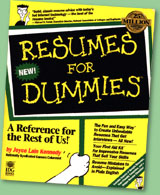
Title: Resumes for Dummies
Authors: Joyce Lain Kennedy
Year 1996
Publisher: IDG Books
Price: $12.99 US
Review by: Dan Reines
|



Title: Resumes for Dummies
|

 |

Hunting for work, well, sucks eggs. Money, pride, and hope are all at low tide, while waves of well-intentioned advice do little besides bring you down. So it's nice when you can get advice from a book that, unlike your Uncle Harry, won't be offended when you put it down. And Joyce Lain Kennedy's "Resumes for Dummies" isn't a bad place to start.In "Resumes," one in a trio of "Dummies" books for job-seekers, an extremely chatty Kennedy hypes up the resume as a "self-advertisement that showcases your skills," and offers tips, templates, and worksheets to help readers create what she calls a "KickButt" resume. (Presumably, a KickButt resume wouldn't involve any phony CompoundWords.)
Much of the advice Kennedy provides should be plain as day to anyone claiming to be worthy of an employer's trust; if you didn't already know that your kids' names have no place on a resume, you're probably wasting someone's time anyway. Then again, having written a nationally syndicated careers column for 27 years, Kennedy's clearly heard three decades worth of stupid resume questions, and apparently this was her chance to answer them all in one shot.
But "Resumes" offers plenty of solid advice as well, especially for those not familiar with the changing methods of today's human resources department. In many cases nowadays, an employer's computer is the first "person" to evaluate your resume, and Kennedy does a nice job explaining how to get the resume past that computer and into human hands. "Resumes for Dummies" isn't for everyone, but it's also not just for dummies.
"KeyWords describe the skills or qualifications needed in the person filling the position. Typically, KeyWords are nouns -- counselor instead of counseled. Substitute management for managed. Nouns are used because that's how positions are usually described. Look at the want ads and check out how they're phrased. Occasionally, a verb will slip out, but don't count on it."
(p. 73)
Map | Search | Help | Send Us Comments